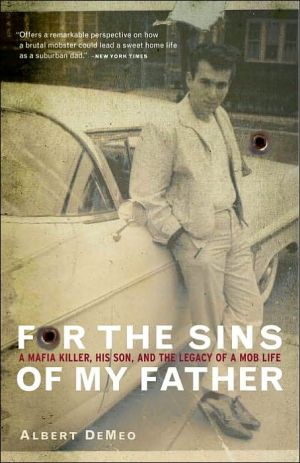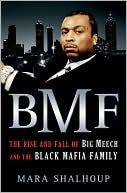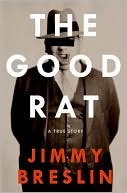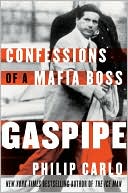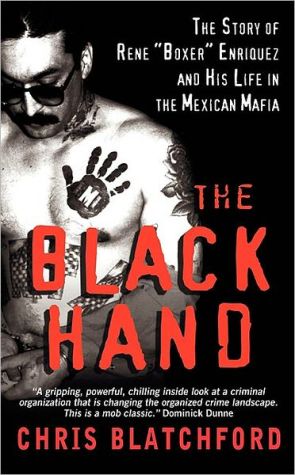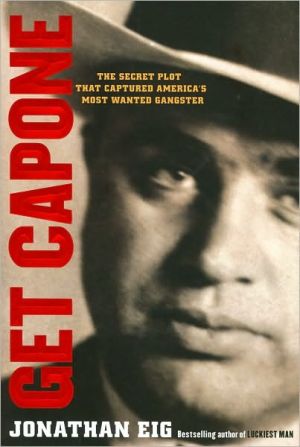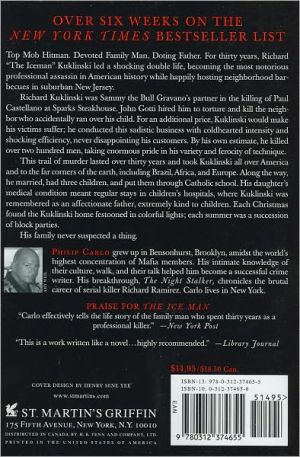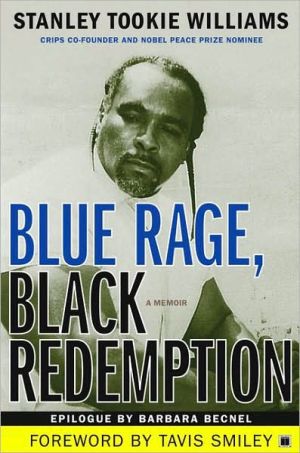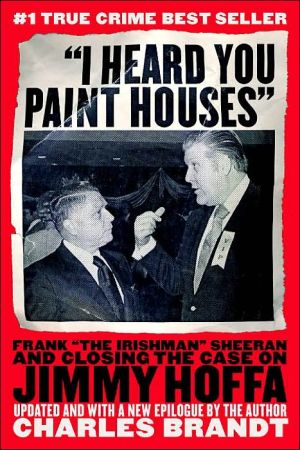For the Sins of My Father: A Mafia Killer, His Son, and the Legacy of a Mob Life
A suspenseful, emotionally charged real-life Sopranos: The son of New York's most notorious Mafia killer reveals the conflicted life he led being raised by a cold-blooded murderer, who was also a devoted family man, and the wrenching legacy of Mafia family life.\ Al DeMeo will never forget the day in 1992 when a coworker, a fellow trader at the New York Stock Exchange, taunted him with a copy of the hot new book Murder Machine, chronicling the horrific criminal life of DeMeo's father, Roy,...
Search in google:
A suspenseful, emotionally charged real-life Sopranos: The son of New York's most notorious Mafia killer reveals the conflicted life he led being raised by a cold-blooded murderer, who was also a devoted family man, and the wrenching legacy of Mafia family life. The New Yorker From the age of eight, Al DeMeo spent a lot of time with his father, Roy -- on loansharking collections, in the auto-repair shop from which he directed New York's largest car-theft operation, and in Little Italy social clubs where his Mafia associates gathered. But Roy DeMeo was also abstemious, devoted to his wife and children, and a prudent businessman whose many legitimate enterprises camouflaged his criminal ones; his son's account of this complex, compartmentalized life is a rich stew of anthropological detail, confusion, and shame. It was onlyafter Roy was murdered -- shortly before Al's seventeenth birthday -- that the author learned his father had been a hit man, rumored to be responsible for more than a hundred killings. This heartsick memoir charts DeMeo's attempt to come to terms with that discovery.
one\ FAMILY\ Let us go then, you and I,\ When the evening is spread out against the sky\ Like a patient etherized upon a table;\ Let us go, through certain half-deserted streets,\ The muttering retreats\ Of restless nights in one-night cheap hotels\ And sawdust restaurants with oyster-shells:\ Streets that follow like a tedious argument\ Of insidious intent\ To lead you to an overwhelming question . . .\ Oh, do not ask, "What is it?"\ Let us go and make our visit.\ —t. s. eliot, The Love Song of J. Alfred Prufrock\ My earliest memory is of blindness. I was four years old when I woke up in a hospital crib with patches over my eyes, darkness all around, utterly alone. Confused and disoriented, for a moment I could not understand where I was or why my parents had left me there alone. Then I remembered: I'd had an operation to fix my crossed eye. Fear and loneliness whispered in the invisible room where I lay, and I cried out for my mother and father. When the bandages came off a few days later, the first image to emerge from the blur was my father's worried face. Looking back, it seems fitting. I have spent more than thirty years since then struggling to bring him into focus.\ I was born in a quiet residential Brooklyn neighborhood in 1966, the second child of parents barely out of their teens. I had an older sister named Debra and a teenage stepbrother in my Uncle Joe. My grandfather DeMeo had died when Joe was a baby, and when Grandma DeMeo returned to her native Italy without Joe, my parents took him in as their own. The five of us formed a happy, traditional Italian-American family. A year later we moved to suburban Massapequa, where my younger sister Lisa was born. Grandma returned to Brooklyn shortly before Lisa was born and moved in with her closest friend, Mrs. Profaci—"Mrs. P," as I called her. Once again, the family was complete.\ Mrs. P lived just down the street from the two-story brick duplex where my father had grown up. It was a green neighborhood in the springtime, with tall, well-established foliage and small shrines to the Virgin Mary in nearly every front yard. The Profacis' towering brick mansion dominated the quiet street. Twice a year until I was five or six, my father took me there to spend the night with my grandmother, down Flatbush Avenue, through a maze of side streets, and up to the corner lot where Mrs. Profaci's house stood. The Profaci home was like another world, a realm of elegant timelessness. The living room was filled with delicately curved gilt French furniture, always perfectly maintained. Pale satin drapes and lace panels covered the windows. Mrs. P was equally elegant in her high heels and pearls. The scent of Chanel No. 5 would wisp into my nostrils whenever she bent to kiss me. With her silver blond hair swept into a French twist, she seemed a human embodiment of the golden furniture that filled her home.\ Mrs. P didn't own a television, so our evenings there were spent in quiet conversation in the kitchen after dinner. Grandma and Mrs. P spoke Italian to each other, but they spoke English to me. Grandma loved to talk about Mrs. P's brother-in-law, Joseph Profaci.Grandma admired everything about him—his custom-made clothing; his luxurious car; the lavish gifts he made to his family; and most of all, the way everyone looked up to him. "Your grandfather was just an ordinary working man, Albert," she would tell me. "But Joseph Profaci—he was something special. I pray God your father is half the man someday." One time I asked Mrs. P how her brother-in-law got so rich, but she changed the subject. Mrs. P didn't seem to like talking about him.\ I lived in Massapequa, Long Island, for ten of my first eleven years. It was a wonderful place to grow up. The streets of our neighborhood were wide and clean, the sidewalks lined with children's bikes. It was the kind of place where you could sleep outside on a summer night and feel perfectly safe. My early years there were filled with joy and contentment. At the core of my sense of security was my father.\ No one could have asked for a better father than mine. He was a husky man with dark hair and kind brown eyes, and though he was only five feet, nine inches tall, he was a giant to me. He could pick me up and toss me around as effortlessly as a cotton ball, and he often did. I loved to ride on his shoulders. He spent more time with me than any of the other fathers in the neighborhood spent with their kids. Most of the other fathers were firemen, policemen, teachers, or small business owners who worked on the island and had to be at work by nine o'clock every morning. My dad was different; he was home in the mornings, so he walked me to school while my mother cleaned the house and started lunch. When the other kids were kissing their moms good-bye, I was hugging my dad. Sometimes he brought me a doughnut when he came to pick me up a couple of hours later. I wasn't exactly sure what my father did for a living, and I didn't care. I just liked being with him.\ On sunny weekends my father took my sisters and me for hikes in the nearby nature conservancy. Dad loved being outdoors with us. Dad; our German shepherd, Major; my sisters; and I would all head out after breakfast carrying bags of stale bread my mother packed for us. The path behind our neighbors' house led to a trail through the trees and about half a mile down to a preserve with woods and a small lake. The lake was filled with ducks and swans, and my sisters and I would crouch down near the water's edge and coax the birds with pieces of stale bread. Afterward we would hike through the woods until we got tired. When we were ready to rest, we headed for the big log near our favorite tree to sit down. My father always carried a switchblade. One afternoon my father took the knife from his pocket and carved all of our names on the tree, along with the date. After that we thought of it as our tree, and we visited it whenever we could. It was a DeMeo family secret, our special place in the woods.\ Sometimes my dad took me for rides in the car with him on the weekends. One Saturday he told me he was taking me to the airport to meet someone named Uncle Vinny. "Uncle Vinny isn't a blood relation, Allie, just a friend of mine," he told me when we pulled into the terminal. I was too interested in watching the planes take off and land to pay much attention when my father introduced me to Vinny.\ "How ya doin', Albert?" Vinny asked as he bent to shake my hand. He had on a blue uniform with his name embroidered on his shirt. We went back into the cargo section with Vinny so my father could talk to him, but I couldn't hear a word they said over the roar of the planes. I explored the dusty cargo area while Dad and Uncle Vinny talked. Vinny looked very earnest and waved his hands around a lot while my father shook his head the way he did when I was naughty. Finally Uncle Vinny gave my father an envelope, and we left.\ It wasn't long until I saw Uncle Vinny again. Early the next Saturday morning Vinny drove up in a station wagon filled with crates of fresh fruit. My sisters and I lined up on the curb to watch as he carried the wooden crates into our house. We had never seen so much fruit. Along with the ordinary bananas and oranges, there were exotic fruits like guava that not even my mother had ever seen. My mother shook her head as she sorted through the crates, murmuring that there was enough here for half the neighborhood. Uncle Vinny smiled sweetly and murmured, "A little gift for you and the children, Mrs. DeMeo." The following Sunday he brought us boxes of imported chocolate. The weekend after that he brought beautiful London Fog raincoats for us kids. Trailing behind him back out to the car that afternoon, I asked him where he got all this stuff.\ "They're F-O-T, Albert," he told me. When I looked blank, he winked at me and said, "You know, F-O-T. Fallen off trucks." I was amazed. How could the truck drivers be so stupid? This was a lot of stuff. It must be worth an awful lot of money. Uncle Vinny had brought more coats than we needed, so my mom gave the extras to Barbara and Jim, my parents' best friends on the block, for their kids. Jim was a policeman who didn't make much money, so Barbara was really excited to get the coats. Vinny continued dropping things off for us at least once a week, and after a while I started wondering why the truck drivers didn't just pick this stuff up if it wasn't damaged.\ Finally I asked my father about it. He eyed me for a moment, then smiled and said, "Son, can you keep a secret? Man to man?"\ Of course, I could. I was proud that my father trusted me.\ "Your uncle Vinny steals things. He's a nice guy, but he steals just about anything he can lay his hands on. And he bets on horses a lot, so I loaned him some money, and he can't pay it back because he keeps betting. This is his way of repaying me. I don't ask him where the stuff comes from. I don't want to know."\ Uncle Vinny was a thief? But he seemed so nice, and I could tell my father liked him. If my father liked him, he must be all right.\ Saturdays were good, but Sunday was the best day of the week. My father got up early on Sundays to cook us breakfast. My Sunday alarm was the sound of the juice machine as my father squeezed fresh orange juice to go with the meal. I piled into the kitchen with my sisters one late spring morning to find the table loaded down with stacks of pancakes, butter and warm syrup, homemade hash browns, eggs to order, and bacon and sausage. We ate until our stomachs hurt as my father sat and watched, smiling to see our enjoyment. Afterward my mother chased us upstairs to get ready for church.\ In half an hour, we were all back downstairs in our Sunday best. My sisters had lovely dresses and patent leather shoes, and I wore a nice suit and tie, with my shoes polished and my nails manicured. While Dad cleaned up from the morning's cooking, my mother drove us to the local Lutheran church and walked us each to our respective classes. Then she left to do errands while my sisters and I attended Sunday school and mass. She never came with us. Mom had been raised Lutheran, and Dad had been raised Catholic. Neither of them practiced their religion anymore, but they wanted us to grow up with a belief in God and good morals: conscientious, well mannered, honest, and respectful. I was polite and well behaved in church, but I found most of the lessons boring. Afterward, my mother picked us all up in the Cadillac and took us home to prepare for dinner and company.\ Uncle Joe drove up in his limo and pulled into the driveway shortly after we got back from church. Joe had salvaged the limo from a junkyard for a hundred dollars and had done the body work himself. I'd sat with my father and sisters at the junkyard every Saturday for weeks, watching Joe work on the car. He used a crane to flip it on one side, worked on it a while, then flipped it on the other side and continued. We kids thought it was the coolest thing we'd ever seen. The limo was a shiny black 1960 Fleetwood Cadillac with all the luxuries: leather seats, radio, intercom, and phone. When Uncle Joe finally got it done, he used it to chauffeur us kids around on Sunday afternoons. One Sunday he took us to Coney Island Joe's for the best burgers and hot dogs in town; the next Sunday he piled us in with a dozen neighborhood kids and took us for ice cream. We all argued over who got to ride shotgun. We had double-scoop cones and then rode back home to eat Sunday dinner. My sisters had each invited a friend to eat with us. I didn't want to invite anybody. I liked to hang out in the workshop or yard with Dad and Uncle Joe, chatting about guy things like cars. Barbara and Jim walked over later in the afternoon and brought their children with them. Jim never pulled Sunday patrol. He came downstairs with Dad and Joe and me while Barbara went inside to help my mother.\ Sunday was "sauce" day for our extended Italian family. My mother had been cooking for hours in the big downstairs kitchen by the time we got back with Joe: chopping ingredients for marinara sauce, mixing flour for homemade pasta, and grinding sausage for Italian meatballs. Barbara washed and mixed the salad greens and sliced the bread. Uncle Vinny had delivered several baskets of fresh bread that morning. Mom had made desserts the day before while we were out with Dad: brownies, pie, and three kinds of cookies. Dad had also made his specialty while we were at church—zabaglione, an egg custard made with muscatel wine and served warm over fruit. I came in the house every hour or so to sample the goodies. The aromas surrounding me in the warm kitchen gave me a heady rush. Mikey Hammer and his wife walked into the kitchen at about four o'clock. Like Uncle Vinny, Mikey wasn't really a relative, but he seemed like one. My parents knew him from the old days in Brooklyn. Uncle Mikey was one of my favorite uncles. He was stout and strong, with gray hair and hands like slabs. He was also nearly deaf. I had to shout at him to say hello. Mikey's wife and my mom started talking about gardening, so Uncle Mikey headed down to the basement where the men were talking cars.\ Everything was perfect until my grandmother got up from her nap. Grandma DeMeo had arrived in state the afternoon before while I was out with Dad. My first hint that she was spending the night had been the sight of her huge undergarment hanging on the bathroom door at bedtime. My grandmother always wore a large girdle-brassiere combination made up of whalebone stays that was strong enough to stand up on its own. I could not understand why anyone would wear such a torture device. Her entrance cast a gloom over the cheery kitchen. She sat ramrod straight on the Naugahyde chair, her hair perfectly arranged and her face fully made up. Grandma was a statuesque woman, full busted and vain to a fault. She seemed to fill the room. Suddenly stricken with claustrophobia, I went out into the backyard to see my dad.
\ From Barnes & NobleMoviegoers and TV audiences seem to have an endless fascination with mobsters. For Brooklyn-born Al DeMeo, however, goodfella life holds no voyeuristic thrills. His father, Roy, was not just a loving family man; he was a notorious Mafia killer. As his father's confidant, young Al heard firsthand stories of gangland misdeeds and executions; then, on his 17th birthday, those stories became terrifyingly real when his father's corpse was found in the trunk of a car. This memoir portrays a father-son bond as it is shaken by the grimmest of realizations and perceptively describes the author's coming to grips with his family's past.\ \ \ \ \ The New YorkerFrom the age of eight, Al DeMeo spent a lot of time with his father, Roy -- on loansharking collections, in the auto-repair shop from which he directed New York's largest car-theft operation, and in Little Italy social clubs where his Mafia associates gathered. But Roy DeMeo was also abstemious, devoted to his wife and children, and a prudent businessman whose many legitimate enterprises camouflaged his criminal ones; his son's account of this complex, compartmentalized life is a rich stew of anthropological detail, confusion, and shame. It was onlyafter Roy was murdered -- shortly before Al's seventeenth birthday -- that the author learned his father had been a hit man, rumored to be responsible for more than a hundred killings. This heartsick memoir charts DeMeo's attempt to come to terms with that discovery.\ \ \ Publishers WeeklyWhile it' s understandable that the publisher compares this memoir of life in a Mob family to The Sopranos, the book stands firmly on its own as one of the most searing volumes ever written about the Mob. (Mafia cognoscenti will recognize the DeMeo name, for the author' s father, Roy, gunned down by fellow mobsters in 1982, has in recent years gained a reputation as one of the most ruthless members of the Gambino family, responsible for dozens of killings.) DeMeo' s coauthor, Ross (In the Company of Men), probably deserves credit for the fluid, dark-hued prose that surges throughout the narrative, but what really sets this book apart, in addition to its brutal honesty, is its unique perspective: that of a child drawn into a macho world of fear and violence, money and power. Before Albert was a teen, he had become the principal confidant of his father, who was a soldier and then a made man with the Gambinos, picking up payoffs, familiar with wise guys and guns; Albert' s involvement was such that only a few years later he practiced, with his dad, at what angle he would shoot Roy when and if Roy needed to fake his own death. There' s the familiar other side of Mob life here, too, the wide circle of eccentric acquaintances and the robust celebrations centered around a nuclear family in which mom and kids (other than Albert) floated unaware of the crimes of father and son; but what eats through this book like acid is the horror, mixed with undying love and loyalty, that Albert feels as over the years he learns just what his father did for money a horror that as an adult would send the author into a mental hospital but which he has now assimilated sufficiently to write this painful, intense, unforgettable memoir. (Aug. 20) Forecast: With the success of HBO' s The Sopranos, which will begin airing again September 15, plus the recent death of Gambino head John Gotti, expect much interest in, and many sales for, this electrifying title. Copyright 2002 Cahners Business Information.\ \ \ \ \ VOYAAlbert DeMeo grew up in New York in the 1970s, the only son of Roy DeMeo of the Gambino crime family. In this memoir, Albert portrays his father's love for his family and his own growing understanding of his father's business. By age six, Albert learns to shoot a gun. At twelve, he carries one to school in case he or his younger sister is threatened by his father's enemies. He finds that his father runs a successful stolen car operation and helps collect payments from his father's sex shops and pornography outlets. Slowly, he discovers that his father also carries out hits for the mob. Seventeen when his father is murdered, Albert becomes responsible for shielding his family from knowledge about his father's profession. He is determined not to continue his involvement in the Mafia, but changing his life is not easy. As a young adult he attempts suicide, ends up in a mental hospital, and begins to recover. Most of this book takes place during Albert's childhood and adolescence, doing a good job of showing what it was like to grow up in a Mafia family. Because of some graphic scenes, it is not easy nor is it a lighthearted rendition of life within a crime family as portrayed in Son of the Mob by Gordon Korman (Hyperion, 2002/VOYA Februray 2003). Mature readers and fans of The Sopranos will find Albert's story and the comparison to their own lives intriguing. Photos. VOYA Codes: 3Q 2P S A/YA (Readable without serious defects; For the YA with a special interest in the subject; Senior High, defined as grades 10 to 12; Adult and Young Adult). 2002, Broadway Books, 275p, \ — Cynthia Faughnan\ \ \ \ \ Library JournalThis is DeMeo's answer to Gene Mustain and Jerry Capeci's Murder Machine: A True Story of Murder, Madness, and the Mafia, published in 1992. Their subject was mobster Roy DeMeo, Albert DeMeo's father. Albert states that Murder Machine contains several untruths. For the Sins of My Father portrays Roy as the man Albert knew, a caring father and devoted family man who happened to be a member of the Mafia. Albert's story is told from the viewpoint of a loving son so caught up in the Mafia lifestyle that he is taught how to fire a gun at age six and in the eighth grade begins making cash collections for his father's loan shark business. On Albert's 17th birthday, Roy's body was found in a car trunk, and Albert began a slow downward spiral into his own private hell. Several years passed before he was finally diagnosed with posttraumatic stress disorder and got the help he needed. A well-written, engaging story of Mafia life told from a different perspective; recommended for public libraries, especially those that carry the Mustain and Capeci book. [Previewed in Prepub Alert, LJ 2/1/01.] Sarah Jent, Univ. of Louisville Lib. Copyright 2002 Cahners Business Information.\ \ \ \ \ Kirkus ReviewsOr, Papa was an Al Capone. Roy DeMeo was not a nice man. A loan shark and auto thief, he graduated to contract murder in the 1970s, becoming a capo of the Gambino family and racking up a toll of more than 200 victims. Yet, in the eyes of his young son Albert, "No one could have asked for a better father than mine. . . . He could pick me up and throw me around as effortlessly as a cotton ball, and he often did. . . . I wasn’t exactly sure what my father did for a living, and I didn’t care. I just liked being with him." Gradually, he acquired more than a few inklings of what his father did in fact do for a living: the expensive gifts and $100 bills at his first communion and the looks of fear on neighbors’ faces eventually tipped Albert off, and adolescence brought more than the usual amount of rejection of the previous generation’s mores. After his father died—"shot seven times in the face and hands," a helpful policemen tells Albert’s mother—and his old crew moved in to divide the spoils, Albert began to look more closely into his father’s life, seeking some explanation for who murdered him and why. Pressured by federal agents to cooperate in their investigation and turn informant, hounded by mobsters fearful that he would do just that, 18-year-old Albert developed bleeding ulcers and a profound dislike for the Mafia. Some of what he reveals in this so-so memoir will be of interest to students of organized crime, but there are many better insider accounts available; and while writing it must have been a cathartic experience, the reader will not forgive such mawkish moments as when Albert puts on a pair of his father’s old shoes and concludes, "I had my own shoes to wear, my own journeysto take." Heartfelt and capably written, but a distinctly minor contribution to mob lit.\ \
